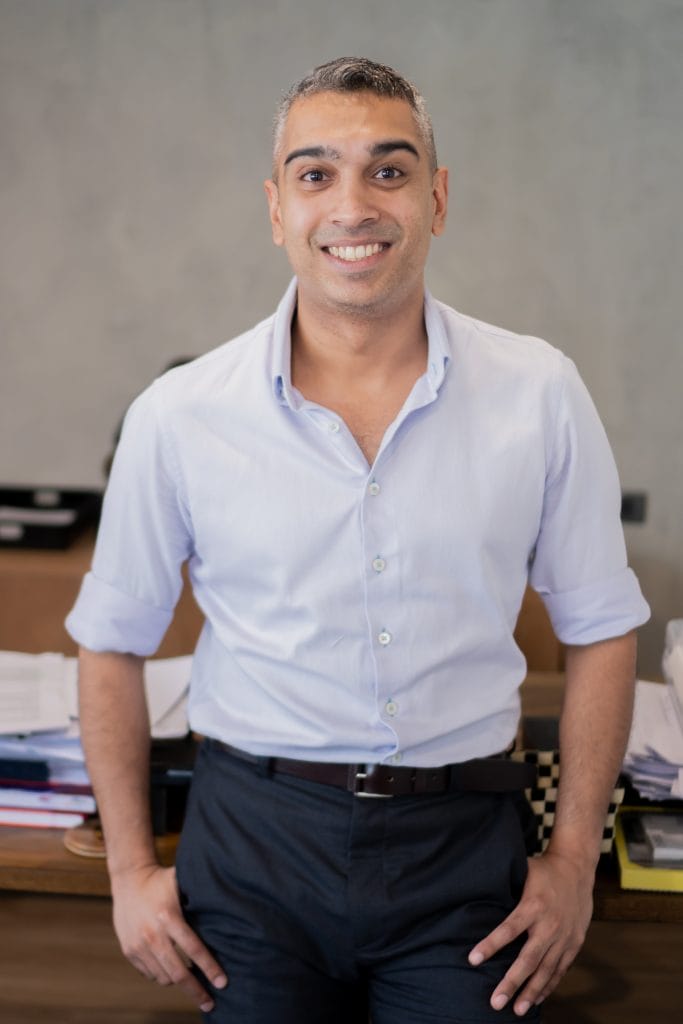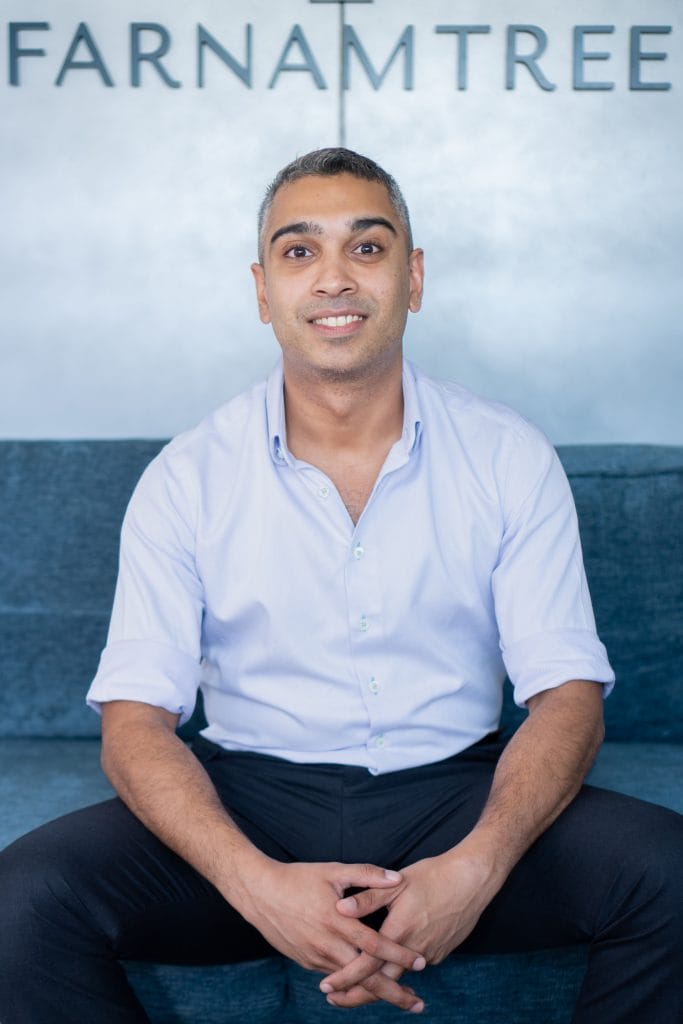Banking on it
By Shaan Bajaj
I have a bright yellow Post-it Note stuck to a whiteboard in my childhood bedroom, with a quote scribbled in messy black ink: “The ability to do what you want, when you want, with who you want, for as long as you want, is priceless. It is the highest dividend money pays.” The quote is from a book, The Psychology of Money, that explains the concept of money in simple terms. I was surprised to hear that Atul Sethi, CEO and Founder of investment and wealth management firm, Farnam Tree, had not only read the book, but believes it taught him more about personal finance and investing than his 12 years working with global bank, Credit Suisse.
Born and bred in Bangkok, Atul was a regular Thai-Indian kid. He attended Ruamrudee International School (RIS), had a passion for The Beautiful Game, and a grandmother concerned that Thailand’s scorching sun would make Atul too dark. As he grew older, his curiosity in wanting to understand how the world works led him to pursue an undergraduate degree in Economics from the University of Chicago, after which he completed an internship with Credit Suisse in his penultimate year of school. After global financial markets crashed in 2008, he feared his job offer would fall through. Fortunately, he started what ended up being a twelve-year career with the firm in the Chicago, Singapore and Bangkok offices.
Although his undergraduate degree helped him land a job in an industry he desperately wanted to be a part of, Atul reveals how different reality was compared to what he had thought it might look like. Starting as an investment banker with no weekends to himself, to becoming a research analyst who meditates, Atul shares his journey at the firm and how it all came together to help him open his own company. Taking inspiration for its name from the street Warren Buffet lives on, and the eponymous popular blog, Farnam Tree was established by Atul to provide a differentiated service from what their clients are used to seeing locally.
Atul sat with Masala to pull back the curtain on the realities of working within the banking industry, while explaining his motivations and hopes for Farnam Tree.
What was your experience like working at Credit Suisse for 12 years, across three countries? How did those 12 years shape you professionally, and how has it affected your financial judgement?
I worked in two different areas; for the first half of my career spanning my years in Chicago and Singapore, I was a junior investment banker. Lots of time in Microsoft Excel and PowerPoint, so I can make you some very pretty slides [laughs]. It was a very high-pressure environment, with very little sleep and lots of coffee. It was brutal; I once ordered a Nando’s with my girlfriend on a Saturday at 11am. I was called in for a ‘fire drill’, basically a situation when everything had hit the fan. I wish I hadn’t picked the call up as I only got back the next morning at 5am. My girlfriend – now wife – re-heated my food for me and that was one of the moments I thought she might be worth keeping.
Although I got to work with intelligent people who are excellent at what they do, I had no life on weekends while I worked in Chicago and Singapore. That changed when I joined Credit Suisse’s team in Thailand as a research analyst covering the banks and real estate sectors. My job was to create and update financial models, analyse industries, companies, and write reports. These reports are published and distributed to institutional investors inside and outside of Thailand. I had to bring my A-game every day, and the environment forces you to learn continuously. I miss working with those high-calibre people, and it serves as a great model of how we want to run Farnam Tree.
As far as personal finance and investing, working in the industry is no guarantee that you develop helpful skills. Being exposed to the information available is helpful but in terms of decision making, I learned more through reading and trial-and-error. In Singapore, when some women in the office were stressed out, they would go to Hermès during their lunch hour and buy a bag; that is how investment bankers dealt with stress! I only started seriously thinking about my investing once I got married. It was like a lightbulb switched on and I realised I needed to learn how to invest for my future. If not, I would be miserable working in investment banking for the rest of my life.
Why did you decide to leave and start you own company, especially when you had a stable and lucrative career in one of the nine global ‘Bulge Bracket’ banks renowned worldwide?
The institutional investment industry is increasingly moving in a direction that conflicts with my view of investing. If I ask you the timeframe in which you expect a long-term investment to grow, what would you say? [I replied with 5-10 years.] In the industry, long-term is now three months, which makes no sense to me. Secondly, I noticed a gap in Thailand’s market. Traditionally, the model in our industry is built on product sales. The people providing advice are trying to sell you a product. That is awful. How can you tell that they are giving you advice in your best interest? Are they recommending you fund x over y because they are making a bigger commission off it or because it is better for you?
Farnam Tree is different; we do not do product sales. Our structure is intentionally set up so our incentives are aligned with our investors, and we run our company with a high degree of transparency. Our focus is mainly on investing outside of Thailand, which is more difficult than it needs to be.
What challenges have you faced since you left and decided to start Farnam Tree? How did you overcome them?
Where do I begin? Things seldom go to plan. One of the biggest challenges has been obtaining a regulatory license from the Thai SEC, a complex process that took us almost two years! They thoroughly inspect our operational structure, to ensure clients assets are safe and in compliance with the regulations, before giving their approval. Everything was in Thai, which was not easy for an international school kid like myself! We did this in the middle of the pandemic and in a challenging investing environment. It also gave me the opportunity to work on setting up the business while lockdowns were going on. I have not overcome these challenges by myself. We have an excellent team that have worked together to get us up and running.
When you conduct investment research, what do you take into consideration? What is a good or bad investment?
These are the rules I follow:
• Can you explain it to a three-year-old? My son is three. I cannot explain what
cryptocurrency is to him, but I can explain what HomePro does. The principle behind it is, “Do you know what your money is being put into?” if not, it is a recipe for disaster. The more complex, the more room for error.
• Do not invest because you are feeling FOMO (fear of missing out) of what your friends are getting into; it is not an investment strategy.
• We are averse to leverage (borrowing to invest). Why expose yourself to something where you can literally wake up tomorrow and [clicks fingers] go bust?
• The ultimate test is, can you sleep at night? If you are worried about it at night, it is not worth losing sleep over.
• When looking at companies, a question you can ask yourself is whether sales are predictable. For example, things that girls spend money on usually have very sticky demand. Demand for makeup and purses are more inelastic than you might think.
Do you consider your (relative) youth an asset or a challenge to overcome when starting your business? In either case, why?
[Laughs] My relative youth! You must have not seen my white hairs. I thought it would
be more challenging; I presumed the older generation would dismiss me as young and naïve. Fortunately, that has not been the case in most instances. I see my age as an asset; I wanted to set up Farnam Tree while I still have the energy.
What piece of advice has stuck by you and why?
Anyone – mostly aunties and my mom – who advocated for meditation and developing a mindfulness practice. This has been very helpful to me. Younger me used to think it was all hocus pocus but I have incorporated it into my life over the last few years thanks to their insistent nudging. It has allowed me to be more present and think with more clarity.
For financial and investing advice, I would recommend reading these books:
• Anything written by Morgan Housel
• The Psychology of Money
• A Random Walk on Wall Street
Is this the career younger you envisioned for yourself? If so, has it lived up to your expectations? If not, what did you envision and why the change in trajectory?
No, probably not. I wanted to work in finance and I thought it would be more glamourous. Big picture, I would say yes because I am in the field I wanted to pursue, but it has been more painful than I expected and more lessons learned than I imagined. Having big expectations will set you up for disappointment and part of being mindful is to focus on what is in front of me.
Finally, any advice for those in the community looking to forge their own entrepreneurial path, like you did?
Thai-Indians have a rich history of entrepreneurship, and there are many who are more qualified than I am to give advice. My two cents is that things will probably not go to plan, and that is OK. Focus on what is in front of you and face your problems head on.








